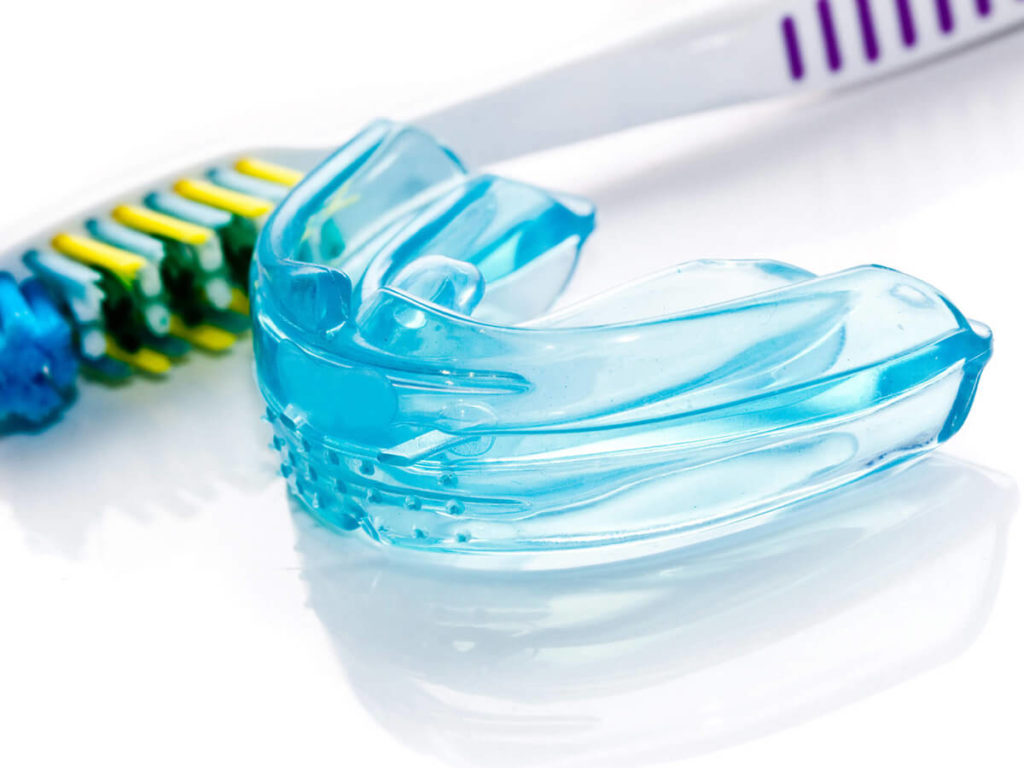Mouth Guards
As an athlete, you need the best gear possible. We offer top-quality athletic mouthguards to protect your teeth whenever you practice or compete.
Mouth Guards and Night Guards
A mouthguard should be considered an essential piece of equipment for every athlete who participates in contact sports and activities—adults and children both. A mouth guard cushions the blow when you are hit and can prevent serious injuries that may result in a lifetime of oral health problems. Our mouthguards are custom made from a lightweight material that is both comfortable and effective and can be easily inserted and removed when needed. They do not interfere with your regular breathing or speaking.
Nightguards are similar to mouth guards but are worn while sleeping to prevent damage from a disorder that causes you to unknowingly clench an grind your teeth while you are asleep. This disorder is called bruxism and leaving it untreated can result in teeth fractures, breakages, headaches, and jaw pain.

-
What are the types of dental mouth guards?
There are three types of mouth guards, which are listed below:
- Stock mouth protectors that come ready to wear. These are inexpensive and can be bought at most sporting goods stores. However, you cannot adjust their fit, they tend to be bulky and sometimes make breathing and talking difficult. Additionally, these types of mouth guards provide minimal protection.
- Boil and bite mouth protectors can also be bought at most sporting goods stores and offer a better fit than stock mouth protectors. This type of mouth guard is placed in hot water to soften and then placed in the mouth to shape around the teeth.
- Custom-fitted mouth guards are designed individually and made in the dental office based on your dentists’ instructions. Your dentists will first make an impression of your teeth and then mold the mouth guard over the model. This type of mouth guard provides the most protection and comfort.
-
How do night guards help teeth grinding?
Under normal circumstances, your teeth should only contact for about 5 minutes each day. Normal chewing results in brief intervals of contact between enamel surfaces, the hardest substance in the human body. Slight amounts of wear over years of function frequently occur, and bite edges can chip a little. But these durable surfaces should wear at nearly undetectable rates.
Sometimes teeth develop a flattened, worn appearance, even in young patients. And x-rays may demonstrate unusually thin layers of enamel as if sandpaper has been drawn across the chewing surfaces of the teeth. A few minutes of chewing daily simply shouldn’t erode the enamel so much.
Some patients develop a subconscious habit of grinding their teeth, either during the day or night. In many cases, the abrasive action occurs only during sleep, and for only a few seconds at a time. If you wake up with a sore jaw or a morning headache, chances run high that you’re grinding your teeth during the night. In some patients, enlarged jaw muscles develop on the sides of the face from the extra activity. These muscles can be the strongest in the body, ounce for ounce. That means they can generate a lot of unnecessary damage.
The unusual activity not only wears down teeth and strains the overworked muscles. The compressive forces can also damage the intricate jaw joints on one or both sides. Damage to the joints may lead to arthritic changes, chronic pain, and popping or clicking. Once these changes settle in, reversing their condition may become impossible.
If you’re waking up with a sore jaw or headaches, or you’ve noticed chips or flattening of your teeth, a consult with Dr. Hammontree should be on your list. The sooner the problem receives attention, the less damage there will be. Often a carefully calibrated night guard with a distinct bite relationship built in will eliminate the symptoms while protecting your precious enamel.
Daytime habits of clenching or grinding deserve attention, and strategies to reduce the problem may be developed. Dr. Hammontree will also analyze the current relationship between your teeth to make sure they’re moving against each other optimally when you chew. Regardless of the cause, eliminating the strain on the jaw and your teeth as quickly as possible can save you many problems as time goes on.
-
Why are mouth guards important in sports?
There are several reasons wearing a mouth guard when playing sports is important. First mouth guards protect against displacing teeth as they help distribute force over all of your teeth, which prevents one, or two, teeth from bearing the brunt of the blow. They can also protect against injuries to soft tissues and prevent jaw and teeth fractures. And, ultimately, mouth guards may help prevent concussions as the padding could lessen the force between the upper and lower rows of teeth and lessen the force of the jaw as it pushes on the skull.
Comprehensive Dental Care
We provide a full array of dental services to suit the needs of individuals and families. Learn more about our services, schedule an appointment, or contact us today.










